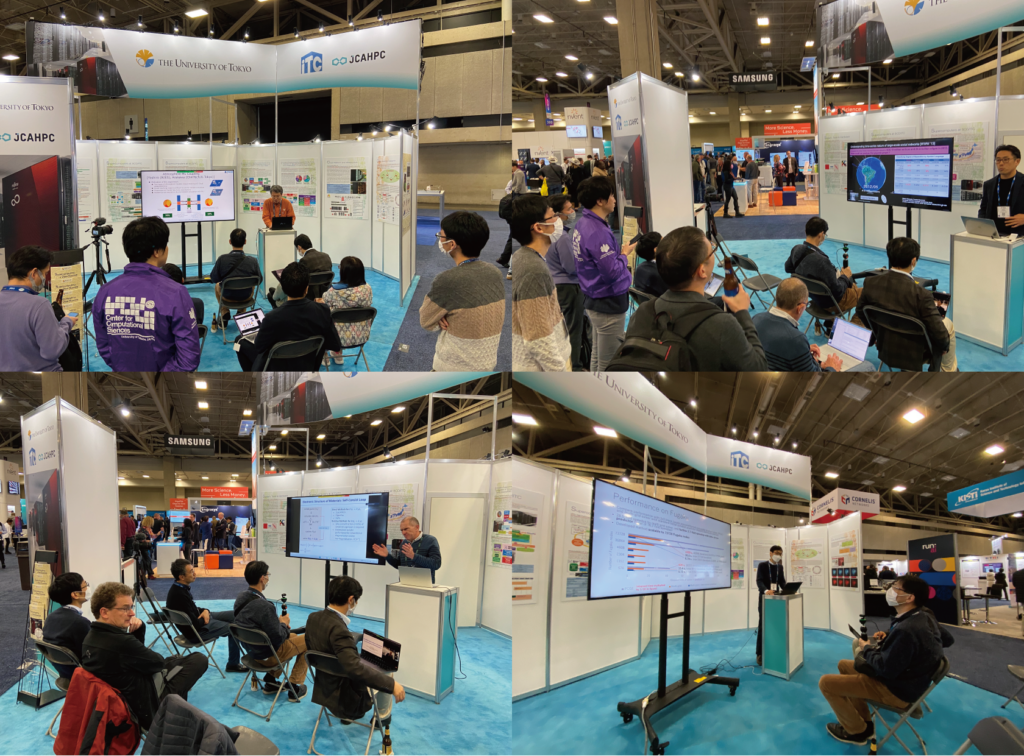UTokyo ITC participates in SC23
7 Nov. 2023
The University of Tokyo’s Information Technology Center participates in SC23 (The International Conference for High Performance Computing, Networking, Storage, and Analysis 2023), which will be held in Denver, Colorado, USA, from November 12 to 17.
At the ITC/JCAHPC, The University Tokyo booth (#1067), we will be exhibiting researches of the Supercomputing Research Division and the Data Science Research Division, the Wisteria/BDEC-01 supercomputer, the mdx data platform. The next supercomputer system of JCAHPC (Oakforest-PACS II: tentative name), which will be jointly introduced by the University of Tsukuba and the University of Tokyo, will also be presented.
In addition, booth talks will be held at the opening reception starting at 7:00 p.m. on the 13th at the same exhibition booth. Subsequent booth talk will be held in CCS/JCAHPC, University of Tsukuba booth ( #1067 ). See JCAHPC Webpage in detail.
Please visit us at Booth #1067 ITC/JCAHPC, The University of Tokyo booth.

Scene of the ITC/JCAHPC The Univ. of Tokyo booth at SC22
Nov. 13 Booth talk agenda (1067 ITC/JCAHPC, The University Tokyo)
| 19:05- 19:20 |
Kengo Nakajima, Toshihiro Hanawa (The University of Tokyo/JCAHPC, Japan) Long but “Straight” Road to OFP-II in JCAHPC |
| JCAHPC, Joint Center for Advanced High Performance Computing, is a collaboration between University of Tsukuba and University of Tokyo since 2013. Oakforest PACS (OFP) with more than 8,000 Intel Xeon Phi is the first system of JCAHPC. At the first appearance in Top 500 November 2016, it was 6th in the world and top in Japan. After retirement of K computer in 2019, OFP worked as the National Flagship System in fact until operation of Fugaku starts in 2020. OFP retired in March 2022. OFP-II, successor of OFP-II, will start its operation in January 2025. It consists of 2 types of node groups, Group-A with general purpose CPUs only, and Group-B with GPUs. Peak performance of Group-B with NVIDIA H100 GPUs will be more than 70 PF. RFP of OFP-II was released in late August 2023, and bid opening takes place immediately before SC23. In this presentation, we will overview the various activities related to OFP-II, and will report the bid opening results. | |
| 19:20- 19:35 |
Estela Suarez (Juelich Supercomputing Centre, Germany) Modular Supercomputing Architecture: from DEEP to JUPITER |
| The variety of applications using or striving to use high performance computing (HPC) resources is growing. The challenge for HPC technology providers and hosting sites consists on coming up with HPC system designs able to cope with such application diversity, while keeping the energy consumption and operational costs at bay. The Modular Supercomputing Architecture (MSA) addresses these challenges by orchestrating diverse resources like CPUs, GPUs, and accelerators at a system level, organizing them into compute modules. Each module is configured to cater to specific application classes and user requirements. Users have the flexibility to determine how many nodes to use within each module, aligning their hardware requirements with their application’s needs. Advanced scheduling mechanisms are used to maximize system utilization. This talk will detail MSA’s key features, hardware, and software components, and discuss MSA’s prospects in the context of Exascale computing. | |
| 19:35- 19:50 |
Jonathan Carter (Berkeley National Laboratory, USA) Current and Future Computing at Berkeley Lab |
| US High-Performance Computing at DOE National Laboratories is facing new challenges and opportunities as we enter the Exascale era. There appear to be four major areas: sustaining the exascale HPC ecosystem and improving beyond it; new computing paradigms, such as quantum computing; more tightly coupling computing resources and experimental data; and an ecosystem to enable Artificial Intelligence to be used as a tool for scientific discovery. I will briefly discuss the challenges and opportunities in each. |

